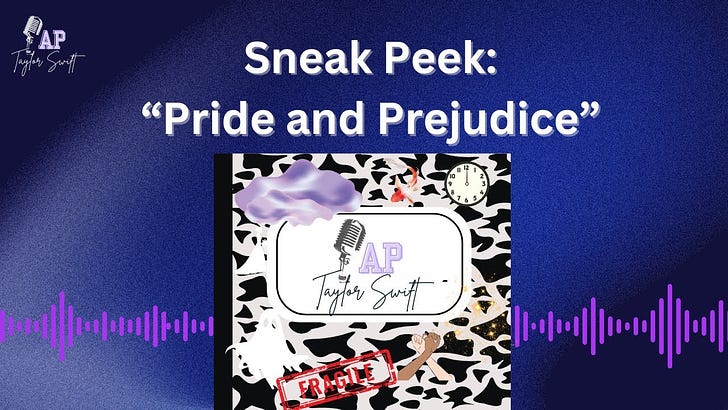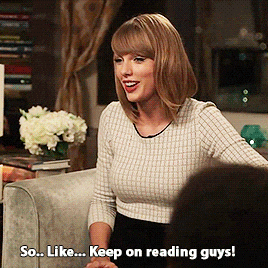Come one, come all, it’s happening again
Finding parallels between "Pride and Prejudice" and "The Tortured Poets Department" in this week's episode, out now!
This week we’re returning to Episode 25 “Pride and Prejudice” to find parallels between the novel and “The Tortured Poets Department.” This is a podcast and AP English Lit favorite, and TTPD does not disappoint in the Pride and Prejudice parallel department. We analyze lyrics from some of our favorite TTPD songs and draw parallels to the story’s plot points, characters, and key relationships in Jane Austen’s novel.
🎥 Sneak Peek
Catch excerpts from the podcast and behind-the-scenes content on YouTube, TikTok, and Instagram!
🛍️ Shop With Us! Active Discount Codes
As we grow, we are so excited to announce new partnerships! Here you’ll find active discount codes available to our listeners.
📚 Bookshop.org Check out all our book recommendations by episode
🔉Libro.fm Support your local bookstore while listening to great audiobooks
Code: APTS
Offer: Get a free audiobook when you start a new membership (you must use this link!)
Receive 2 audiobook credits for $14.99 USD with your first month of membership.Code: APTS30
Offer: 30% off specific audiobooks in the AP Taylor Swift playlist.
✨ Krowned Krystals Make the whole place shimmer with the best rhinestones
Code: APTS
Offer: 10% off your order when you use the link aboveMessage AP Taylor Swift
This Week’s Extra Credit - Brought to You by Jodi
When we first covered Pride and Prejudice, Maansi wrote about how both Taylor Swift and Jane Austen amplify the female experience in their works, focusing on societal expectations for women and how both challenge those norms.
One recurring theme in The Tortured Poets Department that I keep returning to is the role of gossip and an overbearing society. Yes, Maansi covered how Pride and Prejudice and Taylor’s previous albums address societal expectations for women, in TTPD but we see “society” emerge as a larger, more prevalent character than in previous albums. And since Austen’s novel is all about an over-involved, gossip-loving, omnipresent society, this felt like a fitting way to explore parallels between the two works.
All the wine moms are still holding out
“But Daddy I Love Him” grapples with the narrator wanting to make her own choices about her partner, despite the protests of everyone around her. We see “Sarah’s and Hannah’s in their Sunday best,” as well as “the elders” and “wine moms” all with an opinion on the narrator’s choice of her lover. The song immediately made me think of Pride and Prejudice, mostly because I pictured Lydia running through Brighton, dress unbuttoned, screaming “But Daddy, I love Wickham!”
But beyond the Lydia comparisons (which I cover in detail in this week’s episode), the line “these people only raise you to cage you” made me think of the opening lines of the novel,
“It is a truth universally acknowledged, that a single man in possession of a good fortune, must be in want of a wife.”
From the beginning of the novel, we learn that marriage, particularly for wealthy men, is a universal truth. It’s stating outright the cage in which society is raising its women. (Of course, the women in the novel are also in want of wealthy husbands, so it’s not all about the will of men, but I digress). Sarahs, Hannahs, elders, and wine moms abound in Austen’s world, frequenting the balls, showing up in town to gossip about the regiments, whispering about who’s courting whom, who’s a suitable match for whom. Everyone is clutching their pearls in this novel, not over their own behavior or lives, but over the decisions other people make. Everyone has an opinion on everyone else and what they should be doing.
You caged me and you called me crazy
“Who’s Afraid of Little Old Me” speaks directly to the listener the whole song, “Who’s afraid of little old me? You should be.” The “you” throughout the song could be a particular individual, but it also likely represents us: her listeners, whether we be fans, foes, critics, or casual observers. The song speaks about how we are a collection of our experiences and the expectations people have for us: “Cause you lured me, and you hurt me, and you taught me/ you caged me and you called me crazy.” This lyric acknowledges the role that societal pressures play in shaping who we are and how we act. (And there’s another “cage,” repeated from “But Daddy I Love Him”!)
In Pride and Prejudice, Lizzy is a strong-willed, independent woman who refuses to marry just for the sake of marriage—something that drives her mother, Mrs. Bennett, mad when it causes her to refuse Mr. Collins’ hand in marriage. Her desire to marry not just for material gain or status is a direct reaction to how her over-involved society has “taught,” “raised,” and “caged” her. While others like Lydia and Charlotte follow the teachings and trainings of society to marry for wealth and status, Lizzy rebels. She sees what the marriage market did to Jane, sees how others in town speak about eligible men and women, and makes a different decision for herself—to marry for love. Who’s afraid of Elizabeth Bennett? You should be!
Come one, come all
We talked about “How Did It End?” in this week’s episode and how it could relate to a few different characters in the novel, so I don’t want to spoil that conversation—you’ll just have to listen! The first two choruses are spoken from the perspective of society/gossips/interlopers who want to know all about someone else’s relationship and how it ended.
This version of the chorus always gives me Pride and Prejudice vibes after Bingley suddenly leaves Netherfield without telling Jane:
Guess who we ran into at the shops?
Walking in circles like she was lost
Didn't you hear?
They called it all off
One gasp and then
How did it end?
So much of the information in the novel is gleaned from gossip and conversations that happened “at the shops.” Lydia learns of Wickham and the regiment’s arrival at Netherfield from whispers and conversations she hears in town. Wickham spreads rumors about Darcy. Everyone has something to say about everyone else! Re-read the novel, then listen to “How Did It End?”, and you’ll see it’s basically the novel’s theme song.
All three songs drive home the role of gossip and the pressure an over-involved society places on people, particularly young women. While The Tortured Poets Department focuses on the struggles of a personal relationship, it’s curious how many songs have a third person in the relationship: society. It’s a theme Taylor’s explored before: “All they keep asking me is if I’m gonna be your bride/ the only kinda girl they see is a one night or a wife.” Whether you’re Taylor Swift or Elizabeth Bennett or an average woman reading this Substack, society has expectations clear for women, and those expectations involve getting married—to the right person. And if you don’t meet those expectations and instead prefer to be, say, a childless cat lady—someone’s going to voice their dissent. Loudly. It’s up to us to take a page from Elizabeth Bennet’s book, or Taylor’s lyrics, and say, “Who’s afraid of little old me? You should be.”









